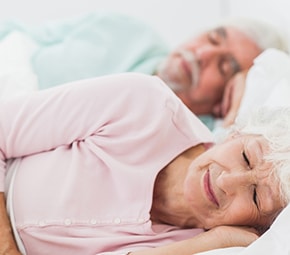As we age, we tend to experience normal changes in sleeping patterns. Staying up until two in the morning might not come as easily as it did in youth. These little changes are completely normal, but not being able to stay asleep, waking up groggy, in pain, or feeling tired after sleeping for a good amount of time is not.
No matter what your age, sleep and the lack of sleep is something that can directly affect your mental and physical wellbeing. This is especially important as one ages because sleep helps you retain ability to concentrate and form new memories by allowing the body to repair any cell damage that has occurred throughout the day. Sleep also adds some pep to the immune system, important for preventing disease.
As we age, some of the normal processes our bodies go through like producing growth hormones that require deeper sleep tend to fall off. This makes your body produce less melatonin, meaning you will sleep more often, but for shorter periods of time. The internal clock that you have created over your younger years is somewhat “on the fritz” so to speak. To combat this you may need to nap during the day to get the sleep you are missing during the night. Again this is completely normal as we age.
The following symptoms might suggest a deeper issue surrounding your sleep patterns:
- Difficulty falling asleep even when you feel tired
- Trouble falling back to sleep when you are awakened
- Lack of feeling refreshed after sleep
- Irritability or sleepy during the day
- Lack of emotional control
- Constantly relying on sleeping pills to fall asleep
- Concentration is lacking
- Difficulty staying awake if not being stimulated
These symptoms could mean you are experiencing insomnia like effects as you age. There some interesting causes that can lead to insomnia. This can range from poor sleeping habits like falling asleep with the TV on, to disorders like restless leg syndrome. On top of these issues, one can experience insomnia because of stress and anxiety and even medications that have side effects that interfere with sleep.
Tips for a Good Night’s Sleep
Often times when we age we lose that sense of “doing” that our younger selves were so engaged in. Just because you are retired does not mean you cannot still try to be involved in certain activities. These activities will prepare your body for sleep.
In addition to staying active, getting outside, improving your mood, and limiting caffeine will certainly add a more positive outlook for your mental well-being. Talking to someone can alleviate stress and anxiety, and reducing the consumption of stimulants before bed can help you calm down before bed.






